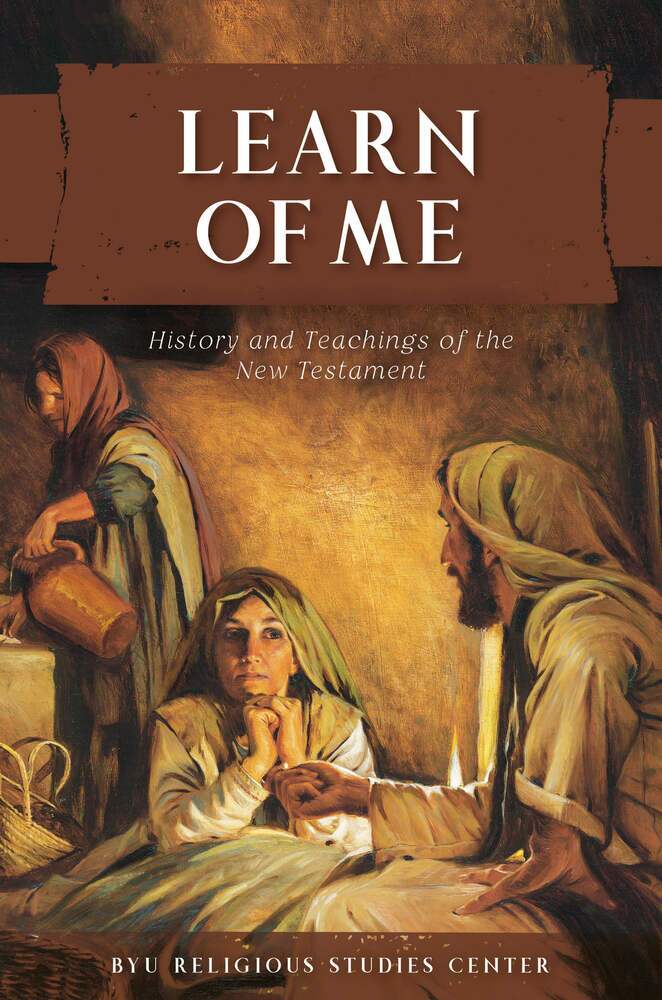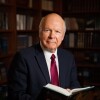Latter-day Saint writers, including general Church leaders, have not written or spoken of the doctrine of calling and election very often, not because it is a forbidden subject, but rather a sensitive one. Furthermore, because the Brethren have said very little about it publicly, that is not an announcement that we should avoid it like a plague, that the teaching has somehow fallen on hard times, that it has been officially relegated to the category of folklore or pop theology, that it is out of date, or that it is no longer held to be the doctrine of the Church. For heaven’s sake, this precious truth is found in the standard works, within the New Testament, the Doctrine and Covenants, and the sermons of the Prophet Joseph Smith. And when it comes to relevance or timeliness in the twenty-first century, what could be more everlastingly pertinent than the quest for eternal life and the sweet assurance that one’s salvation is secure? …
Peter counsels us, “Wherefore the rather, brethren, give diligence to make your calling and election sure: for if ye do these things ye shall never fall: for so an entrance shall be ministered unto you abundantly into the everlasting kingdom of our Lord and Savior Jesus Christ” (2 Peter 1:10–11). The first part of this verse is difficult to understand, particularly as it has been rendered in the King James Version. Alternate translations of “Wherefore the rather, brethren” include “All the more reason, brethren” (Revised English Bible) or “Be all the more eager to confirm your call and election” (New Revised Standard Version) or “Be all the more eager to make your calling and election sure” (New International Version). That is to say, “Don’t be shortsighted or spiritually vacuous, but instead do all within your power to make your calling and election sure.”
The words calling and election are often used interchangeably. In scripture they tend to refer to a duty or an assignment, a responsibility within God’s kingdom. Elder Bruce R. McConkie explained,
To be called is to be a member of the Church and kingdom of God on earth; it is to be numbered with the saints; it is to accept the gospel and receive the everlasting covenant. … It is to be born again; to be a son or a daughter of the Lord Jesus Christ … it is to have a conditional promise of eternal life; it is to be an inheritor of all of the blessings of the gospel, provided there is continued obedience to the laws and ordinances thereof.
The Lord’s calls are the result of foreordination and grow out of faithfulness in the [premortal existence]. … That is, the saints were foreordained in the councils of eternity to believe the truth, to be sanctified, and to save their souls; and then in this life they are called to that gospel whereby these eternal promises can be fulfilled. … And if by a long course of trial and obedience, while yet in this life, a man proves to the Lord that he has and will abide in the truth, the Lord accepts the exhibited devotion and issues his decree that the promised blessings shall be received. The calling, which up to that time was provisional, is then made sure. The receipt of the promised blessings is no longer conditional; they are guaranteed. Announcement is made that every gospel blessing shall be inherited. …
To have one’s calling and election made sure is to be sealed up unto eternal life; it is to have the unconditional guarantee of exaltation in the highest heaven of the celestial world; it is to receive the assurance of godhood; it is, in effect, to have the day of judgment advanced.1
In other words, the Apostle Peter pointed the minds of the former-day Saints toward their eternal possibilities. He encouraged them, knowing of trying times which lay ahead as they moved toward the end of the age, the end of the dispensation. In the words of Paul, the Saints were to “press toward the mark for the prize of the high calling of God in Christ Jesus” (Philippians 3:14). Would they make mistakes after receiving the assurance of salvation? Of course they would. Would they sin? Yes, for no person, except the Lord Jesus, has walked this earth and remained free from sin. While the inclination to commit serious sin will generally have been banished from the soul of such a righteous man or woman (see Mosiah 5:2; Alma 13:12; 19:33), yet the pull of the flesh will remain as long as we reside on a telestial earth.
President Brigham Young asked,
Will sin be perfectly destroyed? No, it will not, for it is not so designed in the economy of heaven. … Do not suppose that we shall ever in the flesh be free from temptations to sin. Some suppose that they can in the flesh be sanctified body and spirit and become so pure that they will never again feel the effects of the power of the adversary of truth. Were it possible for a person to attain to this degree of perfection in the flesh, he could not die neither remain in a world where sin predominates. … I think we shall more or less feel the effects of sin so long as we live, and finally have to pass the ordeals of death.2
Consequently, persons who have made their calling and election sure to eternal life are required to be vigilant, humble, and dependent upon the Lord for spiritual protection, and to strive to be true to their covenants until they pass through the veil and are safely dead! When they fall, they “shall rise again” (Doctrine and Covenants 117:13). As President Young said on another occasion: “It requires all the atonement of Christ, the mercy of the Father, the pity of angels and the grace of the Lord Jesus Christ to be with us always, and then to do the very best we possibly can, to get rid of this sin within us, so that we may escape from this world into the celestial kingdom.”3
In a revelation given at the time of the organization of the restored Church, we learn, “And we know that justification through the grace of our Lord and Savior Jesus Christ is just and true; and we know also, that sanctification through the grace of our Lord and Savior Jesus Christ is just and true, to all those who love and serve God with all their mights, minds, and strength.” Now note this warning: “But there is a possibility that man may fall from grace and depart from the living God; therefore let the church take heed and pray always, lest they fall into temptation; yea, and even let those who are sanctified take heed also” (Doctrine and Covenants 20:30–34; emphasis added).
The Presbyterians in Joseph Smith’s day taught that one could not fall from grace and that once salvation was received, it could not be lost. The Methodists taught, on the other hand, that one could in fact fall from grace and be renewed and restored. Joseph taught that the fullness of truth took a road between them both—that in general while people could fall from grace and repent, there was a sin, known as the unpardonable sin or sin against the Holy Ghost, against which even the supernal power of Elijah could not seal an individual.4 The message is clear: every living soul, no matter the spiritual heights to which he or she may have ascended, must endure in faith until the end. Those who have passed the tests of mortality are forgiven of their sins through genuine repentance, just like all of God’s children. While much is required of those who have gained the supernal assurance of exaltation (see Doctrine and Covenants 82:3), all of humankind are saved by obedience to the laws and ordinances of the gospel (see Articles of Faith 1:3; see also Doctrine and Covenants 82:3).5
In this context Peter adds that “an entrance shall be ministered unto you abundantly into the everlasting kingdom of our Lord and Saviour Jesus Christ” (2 Peter 1:11). To say this another way, “For if you practice these qualities you will never fall. For in this way there will be richly provided for you an entrance into the eternal kingdom” (English Standard Version). Or, “For in this way, entry into the eternal kingdom of our Lord and Savior Jesus Christ will be richly provided for you” (New Revised Standard Version). Or, “you will receive a rich welcome into the eternal kingdom” (New International Version).
In summary, we are speaking here of what Paul called the “hope of eternal life, which God, that cannot lie, promised before the world began” (Titus 1:2), being made sure, made solid, made secure. We are reminded of the marvelous words of the Prophet Joseph when he taught: “After a person hath faith in Christ, repents of his sins, and is baptized for the remission of his sins and receives the Holy Ghost (by the laying on of hands), … then let him continue to humble himself before God, hungering and thirsting after righteousness, and living by every word of God, and the Lord will soon say unto him, Son, thou shalt be exalted. When the Lord has thoro[ugh]ly proved him, and finds that the man is determined to serve him at all hazards, then the man will find his calling and Election made sure.”6
Learn of Me: History and Teachings of the New Testament
Notes
- Bruce R. McConkie, Doctrinal New Testament Commentary, 3 vols. (Salt Lake City: Bookcraft, 1965–73), 3:326, 327–28, 330–31.
- Brigham Young, in Journal of Discourses, 26 vols. (London: Latter-day Saints’ Book Depot, 1854–86), 10:173; emphasis added.
- Young, in Journal of Discourses, 11:301.
- Wilford Woodruff Journal, 10 March 1844, The Joseph Smith Papers.
- Citing the Apostle Paul (see Hebrews 10:26) and the Prophet Joseph Smith, Elder McConkie points out that those who have made their calling and election sure who then become guilty of serious sin “must then pay the penalty of their own sins, for the blood of Christ will not cleanse them.” More specifically, those who commit adultery or murder break the seal and go to the telestial kingdom, while those who commit the unpardonable sin break the seal and become sons of perdition. Doctrinal New Testament Commentary 3:343; A New Witness for the Articles of Faith (Salt Lake City: Deseret Book, 1985), 232; Wilford Woodruff Journal, March 10, 1844, 2:363.
- The Joseph Smith Papers, History, 1838–1856, volume C-1 (2 November 1838–31 July 1842).



